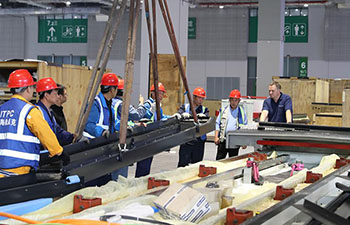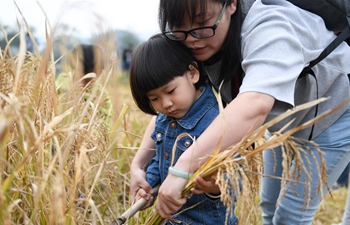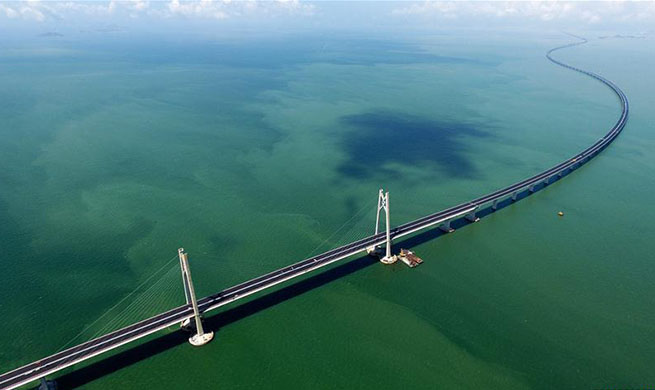ANKARA, Oct. 22 (Xinhua) -- A fatal road accident that has killed 22 migrants in western Turkey, including children, highlights human tragedy despite an EU-Turkish deal with the aim to deter illegal immigration.
The truck carrying migrants on a highway near Izmir airport swerved off the road on Oct. 14, and plunged into a river channel. The migrants, who had inflatable dinghies with them, were reportedly heading to the coast with an attempt to reach Greece's Samos island.
Turkish authorities detained five people linked to the deadly accident, including three suspected Syrian smugglers who took thousands of U.S. dollars from migrants to arrange logistics.
Two weeks ago, eight migrants were found drowned in another district of Izmir when their boat, also bound for the Greek island, capsized. The 26 others who are still missing are believed to have died.
On the opposite shores of the Aegean Sea, 11 migrants were killed in an accident last week.
According to the International Organization for Migration, 28 percent of illegal crossings to Europe occurred in the Aegean Sea and 152 migrants have lost their lives since the start of 2018.
Turkey officially hosts more than 4 million migrants, including 3.5 million Syrians and 500,000 Iraqis. Only a fraction of them are living in specially build camps, while a majority are scattered around Turkish cities.
In 2015, about a million migrants crossed from Turkey into Greece, mostly using the Aegean Sea which separates the two countries, a crisis which forced a deal between Ankara and the EU in early 2016 to stem such flow.
Authorities, whoever, have reported an increase in the number of crossings from the Turkish land border in recent months.
Greek officials reported this week a breach in the border with 200 migrants crossing the Evros river with low water level, an unusually large number in a single morning.
"It's not that we are unhappy here, but Europe is still the light at the end of the tunnel," said Hafez, 28, an unregistered Syrian refugee living for nearly three years in Istanbul.
The Syrian man who spoke in broken Turkish, declined to give his surname for fear of repercussions from Turkish authorities.
He said he did not personally took an ill-fated adventure in the Aegean to reach Greece, but his two cousins did and ultimately failed.
"Luckily, they were saved by the (Turkish coast guard) when their boat nearly capsized and were brought back to Turkey, but it could have gotten really, really serious because we heard stories," he said.
Migrants, of other nationalities such as Afghanistan and African countries, were desperately seeking to cross the Turkish-Greece land border, Hafez added.
In fact, Greece is currently facing a serious surge in the arrival of undocumented migrants in the Evros region, an entry point for migrants trying to illegally enter the country form Turkey.
The migrant arrivals have roughly doubled since 2017, according to the Greek government, blaming Turkey for not doing enough in order to ensure approval of EU payments.
The EU-Turkey deal foresees 6 billion euros (6.9 billion U.S. dollars) payments to Ankara to be used in projects for migrants. Ankara, however, is accusing Brussels of being slow to approve these projects.
In his rejection to the Greek accusations, Turkish Interior Minister Suleyman Soylu told reporters this week that a total of 205,000 illegal immigrants were held in Turkey, mostly Afghan, Pakistani, Syrian and Iraqi nationals, state-run Anadolu Agency reported.
He insisted on a "successful migration policy" by Turkey, saying the detention of migrants crossing to Greece rose significantly over the last five years.
Nevertheless, some undeterred migrants are still visible nearly every day on Turkish coasts in the close proximity of Greece, the main gateway to Europe from Turkey, with the Turkish Coast Guard in hot pursuit, especially along the wide coastline of western Turkey. E
















